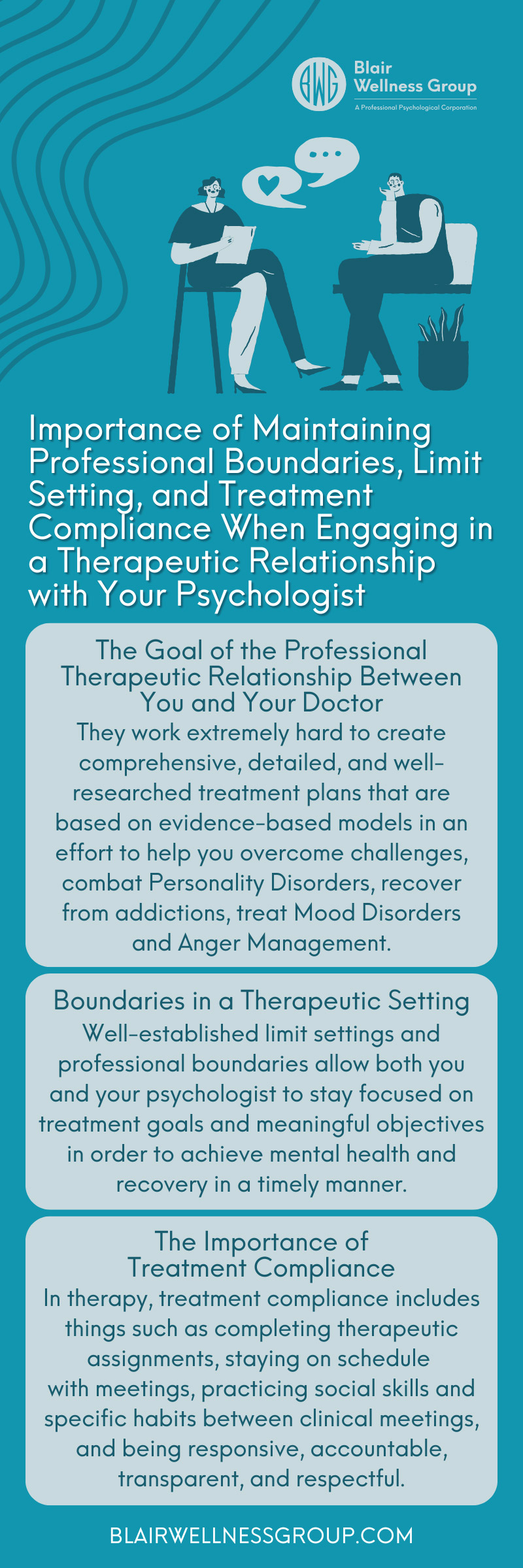Many factors go into making a Mental Health treatment plan successful. Both the patient and the psychologist have a responsibility to commit to the treatment in a collaborative, constructive, and adaptive way conducive to achieving meaningful objectives. To do this, you need a healthy therapeutic alliance and a collaborative rapport with any doctor or practitioner. A strong patient-client rapport based on trust and respect to observe the integrity of the professional relationship sets the foundation for healthy dynamics, open communication, and effective treatment outcome. A weak relationship, on the other hand, leads to blurred boundaries, stagnation in the healing journey, and prevents the patient from achieving meaningful goals and attaining their treatment objectives in a timely manner. This can also cause burnout for the professionals due to not receiving treatment compliance and a collaborative response from their patient.
Understanding what a healthy therapeutic relationship looks like is the key to creating a strong and productive bond with your Licensed Clinical Psychologist and making the most of your treatment. Read on to learn more about the importance of maintaining appropriate boundaries, limit setting, and treatment compliance when engaging in a therapeutic relationship with your psychologist.
The Goal of the Professional Therapeutic Relationship Between You and Your Doctor
Working with a Licensed Clinical Psychologist involves so much more than simply listening to their professional advice or guidance. Your psychologist is helping you uncover deep truths about yourself and your Mental Health. They work extremely hard to create comprehensive, detailed, and well-researched treatment plans that are based on evidence-based models in an effort to help you overcome challenges, combat Personality Disorders, recover from addictions, treat Mood Disorders and Anger Management, heal from your past traumas, and change the trajectory of your life for the better through consistent, methodical, and systematic scientific approaches.
To achieve any of these treatment objectives, however, you must learn to practice trust, respect, effective communication, and professional collaboration to cultivate and sustain a healthy dynamic between you and your doctor. Mental Health treatment is only effective if the patient and their treating doctor are able to work cohesively and collaboratively together. That is why a strong therapeutic relationship is a necessary part of true change, positive treatment, meaningful experience, recovery, and healing. Building, cultivating, and sustaining rapport with your Licensed Clinical Psychologist creates the trust needed to accept professional guidance, admit the need for change, and take tangible actions to follow through in achieving your Mental Health objectives and recovery.
Learn How to Cultivate, Maintain, and Nurture a Respectful and Professional Dynamic with Your Doctor
Another key goal of the therapeutic relationship is to create a space that is based on practicing trust and respect for professional guidance in a harmonious and adaptive environment, instead of rehearsing or reenacting your childhood traumas through inappropriate projections or transference to your doctor or psychologist. Therapy is a vulnerable experience. Your sessions with your Licensed Clinical Psychologist are a place to discuss difficult memories, sensitive topics, in order to make significant progress by realizations you can achieve through sitting with some of the most intense and overwhelming emotions and experiences of your life. Traumatic experiences, negative feelings, and painful thoughts can all arise during sessions. However, projecting those difficult feelings or anger onto your doctor is only going to help you master your past and keep you stuck from being able to move forward.
That is why it is crucial to cultivate, maintain, and nurture a strong, therapeutic relationship with your doctor that creates a healthy dynamic and adaptive environment, instead of pushing back or act out with opposition or discord based on your past traumas or negative relationship experiences. The feeling of trust and respect for your doctor and their expertise is what allows you to practice being vulnerable and speak candidly and transparently about your thoughts, feelings, and experiences without distorting the truth or the need to be validated. The transparency, rapport, alliance, trust, respect, and observing professional boundaries informs your treatment plan and lets your Licensed Clinical Psychologist address the root causes of your Mental Health Disorders, Addiction Issues, Personality Disorders, and relationship challenges. The more you are able to create a healthy dynamic with your doctor based on mindful practice of rapport, alliance, and treatment compliance, the easier it is to identify, understand, and correct challenges in your Mental Health Disorders, Personality Disorders, Mood Disorders, Addictions, and Relationship Issues.
Creating a Healthy Relationship Framework
Mental Health illnesses, addictions, intimacy issues, difficulties in anger management, attachment disorders, and past failures in relationships or life challenges can take a toll on professional relationship with your doctor unless you practice mindfulness and adhering to professional boundaries. Negative emotions, poor self-image, poor communication, lack of social skills training, emotional dysregulation, inability to modulate affect, impulsivity, lack of secure attachment, addictions, intimacy issues, and other emotional or mental challenges can make it substantially difficult to understand and adjust your behaviors despite overwhelming emotions and negative feelings based on past traumas. This potential for cognitive distortions, inability to regulate, lack of mindfulness, high levels of impulsivity, insecure attachment styles, and altered perceptions make it difficult to build and maintain healthy relationships with others particularly when you are working with a Licensed Psychologist.
For many patients, the therapeutic relationship provides a framework for healthy and strong relationships in other parts of life. During therapy, you might build secure attachment by working through trust issues, addressing the fear of abandonment, fear of intimacy, and building adaptive skills, such as positive self-representation and emotional regulation. You might also simply develop and strengthen skills such as effective or adaptive communication, distress tolerance, and learning to be honest, transparent, humble, and vulnerable.
No matter what you need out of your clinical meetings, therapeutic relationships provide the blueprint and a realistic roadmap of what healthy relationship dynamics look and feel like. This gives you the necessary skills to build or rebuild positive relationships with friends, family, colleagues, and romantic partners.
Boundaries in a Therapeutic Setting
The therapeutic relationship between you and your doctor is an intense and vital part of adaptive Mental Health treatment. However, it is only successful when there are clear, consistent, and well-defined boundaries between you and your Licensed Clinical Psychologist. Well-established limit settings and professional boundaries allow both you and your psychologist to stay focused on treatment goals and meaningful objectives in order to achieve mental health and recovery in a timely manner. Crossing those boundaries can blur lines and distract from effective treatments in a timely manner by having to put out distractions or deal with behavioral issues, oppositional conduct, anger outbursts, lack of compliance, and disruptive patterns that have prevented you from practicing humility, trust, respect, and vulnerability in the past.
Professional boundaries between you and your doctor also ensure efficacy, safety, and professionalism every step of the way. Maintaining professional boundaries allows you to progress clearly, adaptively, harmoniously, and intentionally with your treatment without getting defensive, argumentative, angry, or combative. It creates clear expectations and ensures accountability throughout your treatment process. This allows you to continue communicating in an honest, transparent, respectful, open, and professional manner with your doctor.
A lack of professional boundaries or acting out past traumas, anger, discord, inability to trust, or lack of compliance makes it substantially difficult for your Licensed Clinical Psychologist to help guide you in your treatment for Mental Health and recovery.
The Importance of Treatment Compliance
Treatment compliance refers to how well a patient follows professional guidance, clinical instructions, and expert advice from their doctor. In therapy, treatment compliance includes many variables such as completing therapeutic assignments, staying on schedule with meetings, practicing social skills and specific habits between clinical meetings, and being responsive, accountable, transparent, and respectful in building a positive rapport and alliance with your Licensed Clinical Psychologist. Failure to comply with treatment plans hinders your Mental Health, emotional growth, psychological progress, and inevitably lingers the process to achieve positive outcomes.
Non-compliance is not always a conscious choice, though. Factors such as lack of secure attachment, intimacy issues, inability to trust, lack of humility, Personality Disorders, Addictions, difficulty with affect regulation, inability to modulate emotions, impulsivity, social distractions, negative social associations, peer pressure, or a hectic lifestyle can disrupt patient’s progress and interfere with their ability to stay focused, intentional, goal-oriented, and disciplined with their treatment process. This is where treatment compliance, therapeutic rapport, and therapeutic alliance can become difficult or challenging for the patient and take a toll on the therapeutic relationship with your doctor. Licensed Clinical Psychologists give you the tools and knowledge you need to change your life, but that change can only occur when you implement those tools and create a disciplined, constructive, and adaptive environment both in your clinical meetings and at home on a daily basis.
The Importance of Patient Accountability and Self-Discipline
Maintaining appropriate boundaries, limit setting, and treatment compliance when engaging in therapeutic relationships with your psychologist is important because it allows for patient accountability and ownership of their challenges. Patient accountability and self-discipline are one of the biggest struggles and one of the most vital goals of Mental Health treatments.
Licensed Clinical Psychologists want their clients to succeed, but for it to happen, clients must also want this for themselves. It is the psychologist’s job to guide, educate, intervene, instruct, inform, and support patient’s progress, but it is the client’s job to take those learnings and apply them on their own on a daily basis and in a consistent manner. In a healthy therapeutic relationship, both parties know that true change can only come from patient accountability, self-discipline, dedication, and devotion to treatment goals and outcomes.
Clients must have their own sense of determination to make the right decisions, follow the right goals, and perform the right actions in pursuit of their own growth, happiness, and well-being despite of temptations, peer pressure, social stigmas, impulsivity, past challenges, or the need to control treatment variables only to their own detriment. Licensed Clinical Psychologists encourage and cultivate self-discipline, accountability, transparency, and commitment by patients to stick to treatment goals and treatment plans. Treatment compliance and healthy boundaries create the necessary environment for patients to internalize their therapeutic lessons and take big steps toward true healing in their own lives and achieve recovery, emotional stability, Mental Health, and treatment objectives.
If you are looking for Mental Health treatment online from a Licensed Clinical Psychologist in Irvine, Beverly Hills, Newport Beach, Bel Air, Century City, Brentwood, Westwood, Huntington Beach, Mission Viejo, Aliso Viejo, and the surrounding areas, contact Blair Wellness Group to see how our evidence-based treatment plans can help you.

Dr. Cassidy Blair is a renowned Licensed Clinical Psychologist and trusted Performance Coach who specializes in providing Concierge-Psychological Care and Executive Coaching for high-achieving professionals. With a deep understanding of the unique challenges faced by CEOs, executives, entrepreneurs, and leaders, Dr. Blair offers tailored, confidential care designed to foster emotional well-being, personal growth, and professional excellence. Her clientele values her discretion, clinical expertise, and emotionally intelligent approach to navigating complex personal and professional dynamics.
- This author does not have any more posts.




